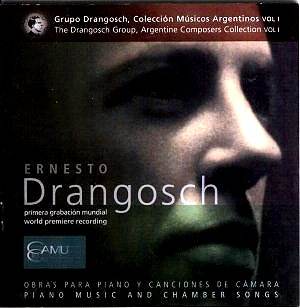Drangosch, a concert pianist, conductor and teacher
as well as a composer, was born in Buenos Aires. His parents were from
Germany. He studied under Alberto Williams (remember Williams who wrote
nine symphonies one of which was recorded on Arte Nova - reviewed here
in 1999). He went to Berlin to study with Barth, Joachim and Ansorge
at the age of fifteen. He was a soloist with the Berlin Philharmonic
variously conducted by Joachim, Busoni and d'Albert. He was a veritable
dynamo of musical endeavour when at the age of 22 he returned to Argentina
and was extremely active concertising and teaching. He evangelised classical
music by playing Beethoven symphonies in picture palaces as accompaniments
to silent films. He died of pneumonia shortly before he was to leave
for Europe to perform as pianist and conductor and to record for RCA.
The Drangosch songs are four-square within the lied-troubadour
tradition rather than the morose depressive strain (the latter beloved
of Schoeck, up to a point by Marx and the Swiss late romantics). Drangosch's
lieder lean slightly towards the delightful operetta strain of Lehár
mixed with qualities typified by Marx's Marienlied. They are
most lovingly shaped by Silvina Martino and Federico Oro Vojacek. Amemos
is of a quite different order. This is a most striking setting which
blends fine Hispanic allure with the Gallic subtlety of Bonnal, Ravel
and d'Ollonne. The piano music is not at all impressionistic. There
is lighter late romantic fare (tangos and a habanera) taking a small
step forwards from people like Macdowell, Flury, Joplin, and Gottschalk.
It must have found a ready market and still has the power to charm.
The Three Pieces are rather grander jeux d'esprits which are
rampant with Bachian energy, the vigour and sensibility of Chopin, sentimentality
(as in the Minuett) and even the gambols of the Unhatched
Chickens courtesy of Mussorgsky. The Fantasia is rife with
the spirits of Chopin and Schumann. It develops a much more original
manner towards its close - always agreeably sentimental.
I have heard Drangosch's Piano Concerto in E major
courtesy of the one of the principal moving spirits behind this disc,
Lucio Bruno-Videla. The Concerto was written between 1906 and 1912.
That 1948 private recording had the concerto played by Delia Drangosch
and the conductor was George Andreani. It is a rip-roaring late-romantic
work which would fit like a glove within the Hyperion Romantic Piano
Concerto series. The cross-references to Tchaikovsky's three concertos
and Scriabin's delectable and early isolated essay are clear enough.
Add a dash of Saint-Saëns' glitter and there you have it. This
is an insultingly simplistic description by me but will give you some
'handle' on what to expect. I hope that it and other works from the
Argentinian classical heritage will begin to find a place on CD and
ultimately in concert. Going by tapes I have very kindly had by Sr Videla
the following works are also well worth consideration: Gilardo Gilardi
(1889-1963) Gaucho with new boots (1936), Celestino Piaggio (1886-1931)
overture (1914), Pascual de Rogatis (1880-1980) Dance from
the opera Huemac (1916), Carlos Lopez Buchardo (1881-1948) Argentine
Scenes - a symphonic poem (1919-1920) and Luis Gianneo (1897-1967)
El Tarco en Flor - another symphonic poem (1929). We already
know something of Gianneo from the three volumes of solo piano music
issued by Marco Polo.
This disc is well documented (Spanish and English),
produced and very nicely recorded. It could, to our advantage, have
had another twenty minutes of music added.
Thanks must go to the Embassy of the Federal Republic
of Germany for their sponsorship of this disc. I hope it will be the
first of many and will snare the attention of both Marco Polo and Hyperion.
Lieder in the lyric Germanic tradition, light dance
solos and two works, Amemos and the Fantasia that give
eloquent signs of a much more potent imagination at work.
Rob Barnett
AVAILABILITY
sysproducciones@ciudad.com.ar
grupodrangosch@navigo.com.ar
www.grupodrangosch.netfirms.com


